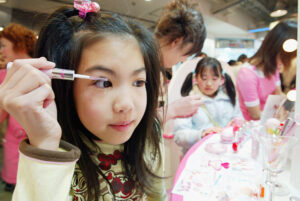Young women pack out Vauxhall’s pubs on a sunny summer evening. They chat over Diet Cokes, pilsners and passion-fruit-flavoured vapes. Many smoke rollies, some do ket and cocaine. Eyes rarely widen at the mention of such things; bring up the Pill, however, and you elicit a flurry of disdain and lively debate.
Once seen as a tool of sexual liberation, the Pill is now often spoken of as a pharmaceutical menace, wreaking havoc with female moods and increasing the risk of cancer. It was first rolled out on the NHS in 1961 — for married women, of course. And though still the most popular method of birth-control, its use is plummeting — data published in June last year showed that community pharmacies dispensed 7.2 million items of progestogen and combined contraceptives in 2022-3. In 2014/15, the number was 8.5 million.
A world away from the groans associated with the Pill, there is an enticing optimism to the chatter around the contraception app of the moment, Natural Cycles. To look at testimonies online is to find yourself in the lexical world of the farmers market — words like “harmony” and “rhythms” crop up just as a wrinkling of the nose, an eye roll, follow any mention of the Pill. How good might it be, I think between big rips of a vape, to be free of chemicals?
There are currently three million users, or “Cyclers”. And the Swedish developers claim a 93% effectiveness rate — similar to the Pill — when used correctly. But the app’s effectiveness is in fact disputed, with many women reporting unwanted pregnancies. The NHS says of fertility awareness methods: “If you do not follow the instructions exactly, it is only 76% effective. This means 24 in 100 women will get pregnant when tracking their fertility for a year.” Aside from this, you have to pay for it. I was quoted £69.99/year to use Natural Cycles, or £9.99/month; the Pill is free for us and costs the NHS £11-18 per year. “It takes a bit of privilege to be able to afford to do all this lifestyle stuff,” remarked one friend. “It’s kind of like being vegan.”
One Cycler friend talks me through the appeal. “The reason I did it was because the alternatives were just shite. I had used condoms for a while and then I was seeing someone who was an absolute arsehole, who refused to use a condom.” The app requires you to take your temperature every day; some looking for more data insights also take a luteinising hormone test — a strip dipped in urine — which indicates when you are about to ovulate.
The theory goes that your temperature rises in line with ovulation — but it’s far from an exact science. “I’ve been using it for two months and my temperature has not gone up when I’ve ovulated,” says my friend. “Another problem is the temperature is declared void if you’re hungover or if you’ve slept differently (three hours more or less than usual) which for me is quite often.” But, she adds, there is a “huge positive”: “This girl I know has the sweetest boyfriend, and they have both downloaded the app, so he can see her cycle days. I think that’s a really sweet aspect of it.”
The app’s effectiveness seems secondary to the lifestyle it implies: one of responsible, communicative relationships, control and modernity. Thinking about my past relationships, I’m not sure I’d want someone to be able to cross-reference my bouts of irritation or friskiness with charts on their phone. But might the dividend, a feeling of purity, be worth it? One hormone-free friend tells me: “I love being in touch with my body and knowing when my period is coming. Obviously if I get pregnant, I’ll probably feel differently but so far it’s been working really well for me, and I love how it feels more natural.”
I can understand this desire. Like most women I know, I’ve been through the ringer. The day after I lost my virginity, a woman in Boots told me with full confidence that I was almost definitely pregnant and had to take the morning-after pill. I fainted from the shock and found myself lying in a side room with my legs in the air, with my best friend trying not to laugh. Then I was put on the combined pill Rigevidon, the architect of so many teen crises. I would cry hysterically, rage at my poor boyfriend, break out in a rash of chin spots. A year on, I got the progesterone-only arm implant. But when I wanted it removed, three years later, muscle had grown so tightly around it that the lady in the UCL sexual health clinic had to spend a good five minutes trying to jimmy it out with a scalpel, blood streaming down the left side of my body. When my hormones went back to normal, I couldn’t cope. I was so used to synthetic interventions that I couldn’t hack being without them. So I came full circle, returning to the chemical embrace of the good old combined Pill.
And the funny thing is, my experiences are very much at the less dramatic end. Almost every straight woman my age is walking around with about 10 years of contraceptive crises behind them — pregnancy scares, alien discharge, battered sex drives, fizzing rage.
One explanation for Gen Z’s particular aversion to the Pill might be its much-touted sexlessness. Much has been made of “puriteens” — who are now entering their monastic mid-twenties. Over the weekend, I asked one pal why on earth she wasn’t using any contraception. “Because I don’t have sex,” she said. “It’s like a solstice,” she conceded. “Bi-annual.” She has high standards, she added. “And men are disgusting” — an afterthought.
The poisonous dating scene may be all the contraceptive we need. It also dampens hopes of a male Pill — if there even was one, would women trust them to take it? Probing further, the common refrains emerge. “I’ve never met a penis that’s worth the risk.”
Most women I speak to also cite cancer concerns. I can pinpoint the exact moment my circles started fretting about this — the publication of an Oxford study in March last year, which showed progestogen-only contraception raised the risk of breast cancer by up to 30%, an effect which disappears a year or so after you stop taking it. The extra cases of breast cancer amounted to eight in 100,000 for those in their late teens, and 265 in their late 30s. In other words, there will be just 0.008-0.265% more cases of breast cancer because of the Pill. The only new information in the study was that the risks of progestogen-only contraception were similar to those of the combined Pill — stats which had been known about for decades. But the ripples of panic among women I knew (and myself, before I looked into it more) were completely out of proportion.
It cannot escape us that a generation so accepting of the considerably greater risks of gender-affirming hormones is so worried about those of the Pill. This tells you, I believe, how ideological the use of oral contraceptives actually is: in a cishet context, synthetic hormones are symbolic of the lack of parity between the sexes (“I feel slightly hard done-by as a woman that we’re expected to take drugs that could potentially harm us when men get off scot-free,” says one friend); for a gender-dysphoric teenager, they are framed as a revolutionary tool.
The final nail in the coffin may, I believe, be the mood changes associated with the Pill. “Instantly when I took it my libido was just zero,” said a friend. “I came off the patch by accident when I was travelling and once I got back I noticed I was a lot less anxious — despite being at quite a stressful point in life,” said another. Another tells me: “I was on all sorts of hormonal contraception for over 10 years and I’ve been doing the pull-out method for a year now. When I first came off the patch this weird dark cloud lifted off me that I didn’t realise was there and had been for years. Like I was basically a little bit depressed all the time without knowing.” I am well aware of the rollercoaster of synthetic hormones — by turns euphoric, terrifying, nauseating, lurching. I have three sisters, and suspect that the stratospheric teenaged dramas in our house at least partly originated in some pharmaceutical lab.
Politically, the Pill has always been grist to any mill going — a cypher for social malaise. Its liberating potential is a big topic in the manosphere — it variously frees men from the apparently oppressive strictures of monogamy or allows women, formerly wiping baby-sick from chins at home as they should, to sail through workplace hierarchies and tread on men’s prospects. In feminist circles, its emancipating qualities have been linked to a casual sex culture which ultimately disadvantages women. While I know this to be true, I think what gives men the desire and ability to pick up and cast aside partners has to do with more than just pharmaceuticals.
What will really sink the Pill, though, is not its cancer risk, mental health impacts or effectiveness — but its susceptibility to the swirl of ideologies that swamps modern women. It has become synonymous with self-fashioning; do you identify as a feminist, are you sex-positive, are you a health nut? Are you a Catholic, are you a witch, are you a femcel? Any one of these labels has a corresponding stance on the Pill. What was once a question of being liberated or not has been swept up in the thousand atomised tribes of modern identity politics. We have forgotten how hard-won reproductive rights are, and look with disdain on many of the women who fought for and secured us those rights in the Fifties and Sixties, and whose views we now deem outmoded. Fragmentary feminism is at risk of forgetting where it came from.
It matters greatly if the Pill falls out of fashion, because in a world where abortion rights are ever more precarious, we need to be on our guard about contraceptive trends — fuelled by exaggeration, misinformation and purity fantasies, they may in fact land any one of us with an unwanted pregnancy. In the sweep of history, having sex without having a baby has only recently become an option — and it may not be forever.
Disclaimer
Some of the posts we share are controversial and we do not necessarily agree with them in the whole extend. Sometimes we agree with the content or part of it but we do not agree with the narration or language. Nevertheless we find them somehow interesting, valuable and/or informative or we share them, because we strongly believe in freedom of speech, free press and journalism. We strongly encourage you to have a critical approach to all the content, do your own research and analysis to build your own opinion.
We would be glad to have your feedback.
Source: UnHerd Read the original article here: https://unherd.com/



